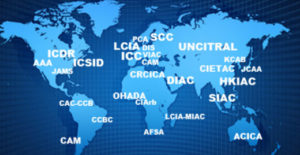After the US election, it was a certainty that in my inbox every morning there was at least one, if not more, email with a discussion on the future of arbitration in our changing society today. And this debate has continued in halls of university law schools to GAR events to law firm seminars. I am reluctant to write more, but the events strike me a little differently, at least as I try to consider present day events in an historical context or some larger big picture.
Recent government pronouncements on trade and immigration can ultimately, if not sooner, have an impact on the “right to arbitration,” a right some may see, as do I, embedded in the freedoms of contract and association. The Trump Administration seems to have some inherent distrust of anyone deciding disputes other than its own handpicked people as the US has walked away from multilateral agreements such as the Trans Pacific Partnership and the Paris Accord, and stating that in renegotiating NAFTA, foreign NAFTA country investors in the United States “are not accorded greater substantive rights than domestic investors,” a shout-out to the Calvo Doctrine. This may eventually not bode well for NAFTA ISDS.
Extraordinarily, in the past few days we have seen the likes of Nobel-laureate Joseph Stiglitz and Trump critic Robert Reich leading a swell of 200 academe to protest the use of ISDS in NAFTA as undermining the rule of law, outsourcing the judiciary, and giving short shrift to “checks and balances.” As well, protectionism and the current America First climate has certainly placed what we have known as globalization in the back seat. The soundings from such arbitration leaders as Gary Born and John Beechey have been well publicized, that economic nationalism or retrenchment and the negative concerns of free trade and globalization on both sides of the Atlantic, could very possibly signal further distrust for the general concept of investor state arbitration. ISDS is under the microscope and under some criticism, possibly with some merit in part, but overall the criticism is unfounded at least in my judgment.
One has to consider not only the benefits and importance of investment treaties as encouraging trade flows, but also that when disputes arise, these might not be particularly suitable to be in local courts. Nimble thinking is required. The pragmatic flexibility, evidently overlooked by Stiglitz’s group and required in any system with a robust rule of law has been described as “[t]he range of interventions…in the rule of law encompasses not only institutional reform within the branches of government, but also experiments that entail partnerships with a variety of stakeholders and the public outside government.” [Lisa Blomgren Bingham, Reflections on Designing Governance to Produce the Rule of Law, 2011 Journal of Dispute Resolution 67 at 73.] Furthermore “initiatives also include private justice systems, such as commercial arbitration and independent arbitrators in response to concerns over a lack of independence in the judiciary, as in the case of bilateral investment treaty arbitration intended to protect private property from expropriation.” (p 87).
The scarier proposition, to me at least, is that the very underpinnings and floor on which arbitration sits may themselves begin to shake with the onset of the above retrenchment thinking leading the charge or setting the stage. It is the arrogation of power in the Executive that has historically led to a failure in the rule of law and the elimination of checks and balances, not private arbitration. History has clearly shown when governments move to centralize power away from democratic individual autonomy, people’s rights are of necessity going to be adversely affected; and it follows that their individual rights to decide how they want their disputes resolved are taken away. This is what happened in the time of Napoleon, and famously in Germany in the 1930s. Moving down to the Mideast, I read recently where the Qatari Court of Cassation has recently decided the national courts are now in charge of arbitration matters, to the degree that it has stripped the arbitrators of the right to decide their own jurisdiction via competence-competence. I have not even addressed Poland, Latin America or other parts of the world.
Furthermore, arbitration, somewhat paradoxically is getting a populist’s black eye, especially in consumer circles, with the latest defeat of the CFPB proposal to curb the banks’ preference for mandatory arbitration in disputes. (This in spite of some evidence the consumer actually does better in its claims in arbitration than in a class action in court). And should US and international lawyers be able to rely on the US federal judiciary, and its own Supreme Court, for continuing pro arbitration pronouncements such as the BG Group decision, when it is very possible a great percentage of the federal bench will change in this Administration? Not likely. (I refer you to the sage remarks of VV Veeder QC on the BG case, long before Trump, in April of 2014, wherein he essentially said “not so fast” on arbitration catching on as the people’s cudgel).
What is at bottom causing this concern and ill feeling? It is likely to be the convergence of the rise of national determinism in the US and abroad as well as the growing distrust of the institution of the arbitral process (an example being the Tapie case in France, where the process was tainted by otherwise respected figures). Chief Justice Roberts eloquently wrote in dissent that it is no small matter when a “state permits private adjudicators to review its public policies and effectively annul the authoritative acts of its legislature, executive, and judiciary.” [BG Group plc v. Republic of Argentina, 134 S. Ct. 1198, 1220 (2014).] And it is a tough sell when a sovereign’s efforts to achieve a clean environment or provide essential services for healthy communities are alleged as violating an investor’s rights in contract, and huge taxpayer moneys are awarded by tribunals not even indirectly accountable to any electorate. This fits right into what we heard from the Stiglitz-Reich group (outsourcing the domestic legal system, losing the checks and balances, no accountability, weakening the judicial branch). Furthermore across the pond in England, much has been written and said about arbitrators not having the same robust effect to law development as do the national courts. Even, the Chief Justice of England and Wales, Lord Thomas, has weighed in with some notoriety, and recently spoken of the need and suitability for courts, not arbitrators, to develop the rule of law.
This criticism, in my judgment, fails to strike the correct balance of interests and account for the bigger picture where “pragmatic flexibility” on our rule of law should prevail to allow such values as individual freedom of contract and allow for free investment flows across borders as well as the allowance of disputes to be heard in arbitration when they are not suitable in local courts. US Laws such as the FAA and treaties such as the New York Convention seem to have understood this balance as well as the real checks and balances as have academics such as Prof Blomgren Bingham. Moreover simply put, in the international transaction, when a border is crossed, the advantages of a neutral forum seem to be compelling, and this greatly outweighs any negative to my thinking. Stephen Breyer has an excellent discussion on this latter point in his recent book, The Court and The World, pp 179 et seq.
In closing, consider the hopefully extreme case. One of the countries’ leading thinkers on modern history and totalitarianism, Prof Timothy Snyder at Yale, has recently written that “(h)istory can familiarize, and it can warn.” Expansion of global trade in modern times, as it did in the 19th and 20th centuries, leads to heightened expectations of the people and also “perceived inequalities.” Leaders then emerge and put a “face on globalization” as resulting from a “conspiracy against the nation.” Professor Snyder’s short book, On Tyranny, offers twenty lessons from the 20th century to keep our liberty and freedom and combat tyranny. Institutions do not “protect themselves” Snyder notes. They fall “one after the other unless each is defended from the beginning.” So it is and, as stewards of the institution of the arbitral process, a process which embraces freedom, we should be ever so mindful.
Further references: S. Breyer, The Court and the World, (2016). T. Snyder, On Tyranny, (2017). Lisa Blomgren Bingham, Reflections on Designing Governance to Produce the Rule of Law, 2011 Journal of Dispute Resolution 67 (2011). Remarks of VV Veeder, QC at Wilmer Hale Seminar, at 37:30.
First Published by Kluwer Arbitration Blog November 8th 2017



